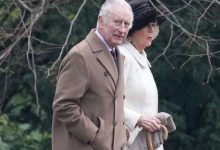Royal Health Revealed: Concerns Arise Over Lack of Transparency in King Charles III’s Cancer Diagnosis

Watan-American doctor Jonathan Rayner said that the lack of information about the type of cancer that has afflicted King Charles III could fuel anxiety and speculation among the British public.
British Prime Minister Rishi Sunak stated on Tuesday that the cancer affecting King Charles III had been “discovered early,” a day after the announcement of the 75-year-old king’s diagnosis.
Addressing rumors about the type of cancer the king was diagnosed with but not disclosed, Dr. Rayner, in an interview with CNN, warned that such secrecy could be ominous. He noted that when the king was admitted to the hospital for benign prostate enlargement, there was an effort to remind the public that he did not have cancer.
Different diagnosis
The American doctor emphasized the importance of transparency, expressing concern that a different diagnosis seemed to have prompted the palace to withhold any details, a move he believed would only stoke anxiety and speculation.
Rayner believed that when public figures face serious illnesses such as heart disease or cancer, removing the stigma and openly discussing their condition humanizes them and encourages others to be proactive about their health.
More transparency
He hoped that the palace would seize this opportunity to be more transparent and help the British public better understand their king’s current health situation.
هذا ما قاله طبيب عن تشخيص الملك #تشارلز بالسرطان.. هل يجب على الجمهور البريطاني القلق؟https://t.co/VXhcrE79lp pic.twitter.com/zwSqJAu9o5
— CNN بالعربية (@cnnarabic) February 6, 2024
New health crisis
In a related context, NBC News reported that King Charles spent the night at home after beginning his treatment, leaving the royal family facing a new health crisis just 18 months after his ascension to the throne following the death of his mother, Queen Elizabeth II.
The palace announces the news
Buckingham Palace announced in a statement on Monday that a “type of cancer” had been discovered during the king’s surgical procedure for benign prostate enlargement. The palace did not specify the type of cancer or its stage but confirmed that Charles did not have prostate cancer.
The palace stated that he remained “fully positive,” but would have to postpone public duties and engagements. It added that the king would continue with state affairs and official duties as usual.
Shock and sadness
In an interview with BBC Radio, British Prime Minister Rishi Sunak said he, like the rest of the nation, felt “shock and sadness” about the news and remained in “regular contact” with the king. He expressed gratitude that the disease had been discovered early and hoped for the king’s complete recovery with the necessary treatment.





